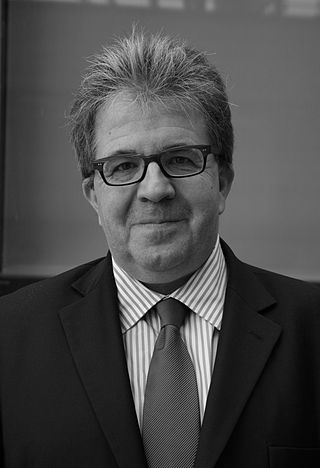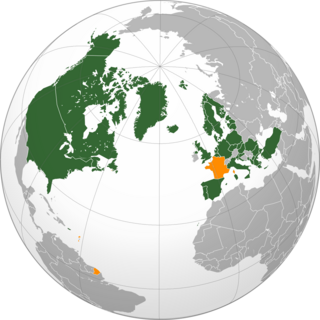
André Fontaine was a French historian and journalist. He started working at Temps Présent, and then was director at Le Monde in 1947, at the official beginning of the Cold War. He became the newspaper's editor from 1969 to 1985, and director from 1985 to 1991. As of February 2007 he was still contributing articles to the paper. André Fontaine is famous for his historical thesis, according to which the Cold War in fact started as soon as 1917 with the cordon sanitaire policy.

Michel Winock is a French historian, specializing in the history of the French Republic, intellectual movements, antisemitism, nationalism and the far right movements of France. He is a professeur des universités in contemporary history at the Institut d'Etudes Politiques de Paris (Sciences-Po) and member of L'Histoire magazine's editing board. Winock has also worked as a reporter for Le Monde.

Pierre Lellouche, is a lawyer and geopolitics specialist, recognized as a right-wing political figure in France. He is also known for his work as a columnist and author. Elected as a deputy in Sarcelles in 1993, he subsequently represented the 4th constituency of Paris from 1997 until his appointment as Secretary of State for European Affairs in June 2009. In November 2010, Lellouche was appointed Secretary of State for Foreign Trade in the Fillon III government, a position he held until the end of Nicolas Sarkozy's presidency in May 2012. He was re-elected as a deputy for the 1st constituency of Paris in June 2012, serving until April 2017, when he retired from elective politics. Since then, he has continued his career as a lawyer, geopolitics consultant, member of influential think tanks, and columnist.
Jean-Pierre Azéma is a French historian.

Shmuel Trigano is a sociologist, philosopher, professor emeritus of sociology at Paris Nanterre University. He was Tikvah Fund Visiting Professor in Jewish Law and Thought at Benjamin N. Cardozo School of Law, New York (2009), and Templeton Fellow at the Herzl Institute (Jerusalem) program "Philosophy of the Tanakh, Midrash and Talmud" (2012-2013), (2015-2017). Elia Benamozegh European Chair of Sephardic Studies, Livorno, Italy (2002).

Yves Roucaute is a French philosopher, Phd, Phd (philosophy), writer, professeur agrégé in philosophy, professeur agrégé in political science, teaching at Paris X University Nanterre, Previous President of the scientific Council of the "Institut National des Hautes Etudes de Securité et de Justice", director of the review "Cahiers de la Sécurité", counsellor of the "réformateurs" group at the French National Assembly. He has held a number of positions in cabinet ministers of right-wing governments, and is a close friend of Alain Madelin, Jean-Pierre Raffarin, and Nicolas Sarkozy. He is also a journalist and columnist He was editing director of some newspapers and he is the owner of newspaper in the south of France and minority stockholder of some others. He is the majority stockholder of "Contemporary Bookstore" SAS.

Dominique Venner was a French historian, journalist, and essayist. Venner was a member of the Organisation armée secrète and later became a European nationalist, founding the neo-fascist and white nationalist Europe-Action, before withdrawing from politics to focus on a career as a historian. He specialized in military and political history. At the time of his death, he was the editor of the La Nouvelle Revue d'Histoire, a bimonthly history magazine.

Philippe Contamine was a French historian of the Middle Ages who specialised in military history and the history of the nobility.

Thomas Gomart is a French historian of international relations and the director of IFRI since 2015. He was previously vice-president for strategic development at IFRI, and director of the Russia/NIS Center and of the trilingual electronic collection Russie.NEI.Visions in English.
Maurice Vaïsse is a French historian specialised in international relations and Defence. He is an editorial board member on Journal of Intelligence and Terrorism Studies.

Christian Lequesne is a French academic. He is professor of European politics at Sciences Po and director of the Centre d'études et de recherches internationales (CERI), and professor at the College of Europe. Additionally, he currently serves as a visiting professor at the Diplomatic Academy of Vienna. He was the first LSE-Sciences Po Alliance Professor at the London School of Economics (2006-2008), a chair funded by the French Ministry of Foreign Affairs. He was the Theseus Visiting Professor at the University of Cologne 2009-2010. He is on the editorial boards or scientific councils of Critique internationale, Politique européenne, and the Journal of European Integration. Christian Lequesne is a member of the advisory board of the Prague European Summit.

Annie Lacroix-Riz is a French historian, professor emeritus of modern history at the university Paris VII - Denis Diderot, specialist in the international relations in first half of the 20th century and collaboration.
Otmar Seul was born on August 30, 1943, in Trier (Germany) and held lectures at the Paris Ouest-Nanterre-La Défense from October 1989 to September 2011 as a Professor of legal German. In cooperation with his German counterpart Werner Merle, he founded the renowned integrated curriculum of French and German law in 1994–1995, joining together the University of Paris Ouest-Nanterre-La Défense (France) and the University of Potsdam (Germany). This curriculum became the centre of a European network of academic cooperation in legal sciences that is open to new forms of studies and research internationalisation. Otmar Seul's most innovative idea was the creation in 2004 of French-German summer universities with other European and non-European countries. His research on industrial democracy and employee participation in companies reflects this French-German and European intercultural dimension.
Dominique Charpin is a French Assyriologist, professor at the Collège de France, and corresponding member of the Académie des Inscriptions et Belles-Lettres, specialized in the "Old-Babylonian" period.
Daniel Moulinet is a French priest and historian, professor of contemporary history at the Catholic University of Lyon.
Pierre-Jean Souriac is a contemporary French historian, a Lecturer in Modern History at Jean Moulin University Lyon 3.
Anne-Marie Devreux is a French sociologist specializing in feminism and the sociology of gender relations.

Yolande Cohen is a Moroccan-born Canadian historian and professor of contemporary history whose research focuses upon History of Youth and the History of Women. A Moroccan Sephardi, she also focuses on the History of Moroccan Jews. In the 1990s, Cohen was a politician, the initial leader of the Coalition Démocratique–Montréal Écologique municipal political party and its candidate for mayor in the 1994 municipal election. Cohen is a Fellow of Royal Society of Canada. Her awards include Knight of the National Order of the Legion of Honour and Knight of the National Order of Québec.
Lilly Marcou is a French historian of Romanian origin specialising in the history of communism.

France is one of the founding countries in 1949 of the North Atlantic Alliance to the emergence of which it actively contributed. Since then, France has never called into question its membership of the Alliance in its dual political and military dimensions. It has, however, repeatedly contested its operating methods, particularly in that they give the United States a preponderant role.










